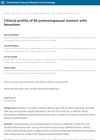Diagnosis, Manifestations, Laboratory Investigations, and Prognosis in Pediatric and Adult Cushing’s Disease in a Large Center in China
November 2021
in “
Frontiers in endocrinology
”
Cushing's disease adenoma excision surgery bilateral inferior petrosal sinus sampling desmopressin stimulation hirsutism acne hypertension osteopenia glucometabolic disorders hair loss pituitary-adrenal axis nephrolithiasis hypokalemia striae irregular menses transsphenoidal pituitary surgery Ki-67 levels CD BIPSS TSS

TLDR Children and adults with Cushing's disease show different symptoms and males have more severe cases; surgery outcomes can be predicted by certain factors.
This retrospective study at Peking Union Medical College Hospital involved 30 pediatric and 392 adult patients with Cushing's disease (CD) who underwent adenoma excision surgery between 2014 and 2020. The study aimed to compare CD manifestations between different age groups and genders. It found that pediatric patients had a lower sensitivity to bilateral inferior petrosal sinus sampling (BIPSS) at baseline compared to adults (75% vs. 91%), but this increased after desmopressin stimulation (94% vs. 95%). Children more commonly experienced growth retardation, weight gain, hirsutism, and acne, while adults showed higher rates of hypertension, osteopenia, glucometabolic disorders, easy bruising, hair loss, and weight loss. Male patients had a higher prevalence of CD in pediatric cases compared to adults (50% vs. 17%) and showed more severe clinical manifestations, which may be due to higher secretory activity of the pituitary-adrenal (PA) axis. Gender-related differences included higher rates of nephrolithiasis, hypokalemia, hypertension, easy bruising, osteopenia, and striae in males, and irregular menses, hirsutism, and hair loss in females. Immediate prognosis after transsphenoidal pituitary surgery (TSS) could be predicted by operation history, tumor invasiveness, Ki-67 levels, and MRI findings, but long-term prognosis predictors are still lacking. This study is the first to systematically compare pediatric and adult CD patients, highlighting more severe CD in males, potentially with an earlier onset.

